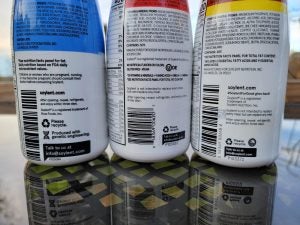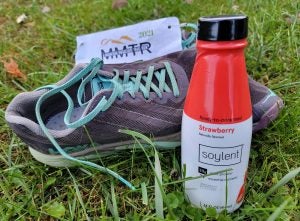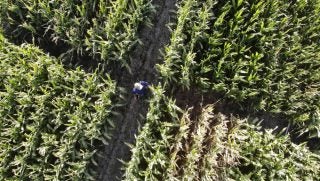CEO Demir Vangelov knows that many of Soylent’s customers feel strongly about the brand: In their minds, “When we do right, we do great right,” he said. “When we do wrong, we do great wrong.”
Since 2018, I have been part of that loyal fanbase, regularly consuming the brand’s popular ready-to-drink soy-based meals. Yet it was with concern and disappointment that I, through an editorial titled Have biotech advocates lost Soylent as an ally in the food industry?, addressed what came across as a “great wrong.”
Dedicated webpages on Soylent.com that celebrated the company’s use of GMO soy — ones with titles like Proudly Made With GMOs and Why is Soylent made with GMOs — were no longer there. The words “Produced with genetic engineering” were stripped from bottles, which for a time were replaced by only white space, while the newest bottles have added the U.S. Food and Drug Administration’s bioengineered label, a required item going into 2022 (even if it is at a near-unreadable 3/16ths of an inch in size on the bottles).

It felt as if Soylent, which has elevated food tech and modern agriculture for so long, was playing down its roots. I was crushed, and many people across Reddit, Facebook, and other social media platforms also expressed regret at the changes being made.
So why minimize this piece of the company that was so vital to helping Soylent standout in a positive way across a food industry where “plant-based” and “processed foods” can sometimes be seen as divisive descriptors?
At the beginning of our conversation, Vangelov was emphatic, “We’re not moving away from science.”
That was welcome news.
Perhaps even more refreshingly, when asked about the missing GMO webpages and why it took four messages to the company to get any kind of response, Vangelov admitted, “We screwed up,” and noted that he and his team didn’t know what happened to those pages amid a site redesign (their removal, he said, was not intentional, even if it was an eyebrow-raising coincidence). He sounded genuine about wanting to be authentic, transparent, and more communicative about what Soylent is doing.
“We do try to pay attention. We should have been catching those things,” he said.
Vangelov served as Chief Financial Officer of Soylent before taking over the CEO reins from Bryan Crowley in early 2020. He talked with AGDAILY at length about what is changing with the company and how his leadership is steering it toward new products and new distribution channels.
“One of things that has changed is that my predecessors were a little more GMO-focused,” said Vangelov, who noted that Crowley was well-known for sporting Pro-GMO T-shirts. “What we’re saying is that science leads us to GMOs, and science tells us that the GMOs we use in Soylent and the other ingredients we use are good for you.
“The one thing we have really emphasized since I started: We design our products based on innovation, which is driven by science. The science tells use that GMO soy is just as good as any other, and guess what, if you include all of the sustainability metrics around it, it’s dramatically better than any other protein out there. That’s where science guides us to be.”
My involvement on the production side of food had me pressing Vangelov often about where biotech fits into the scientific approach of Soylent and whether it will be part of the company’s future. The answer was bigger than that, though.
Soylent, which has about 20 employees, uses farmed soy that carries the Sustainably Grown US Soy mark, indicating that its soy is “grown by U.S. farmers who commit to practices such as conservation tillage, cover crops, and responsible nutrient management,” while also helping to protect highly erodible soils and wetlands and involving family farms with responsible labor practices. Soylent uses GMO soy with this mark, though non-GMO soy is also eligible for this tag.

Like so many people involved in modern agriculture and nutrition innovation, Soylent appears to be leaning into a multi-pronged approach to balance its needs for sustainability, quality, and volume. For farmers, biotech solutions are a key tool, but using a genetically engineered seed isn’t going to automatically make you a great farmer — being able to understand soil health, consider low- or no-till strategies, conserve water and fuel, and minimize inputs while still moving an operation forward are also key metrics.
For Soylent, rather than putting all of the pressure on GMOs as the path forward (as it had seemingly done in the past), the goal is now on four core pillars: complete nutrition, sustainability, innovation through science, and affordability. Finding the best science to fit those milestones is what Soylent is focused on, and Vangelov said that GMOs are still a valuable part of the puzzle.
“It’s not that we’re saying no to our past — we’re actually quite proud of it — we’re just in our next evolution of how we market our products,” he said. “We’re not anti-GMO; we don’t hide it.”
Even though it’s not technically hidden, it’s hard to argue that it’s as apparent as it once was. But, according to Vangelov, that’s part of the design. The greater scientific plan vs. a tunnel vision approach with GMOs.
Food is amazingly complex, and the relationship that people have with their food can be quite intimate. Soylent works with several external labs and scientists to review ingredients and processing approaches, while doing all of its manufacturing and sourcing in the U.S.
Pulling the focus off of GMOs somewhat has helped Soylent become more inclusive, especially as it has moved from being an almost entirely online retailer to a brand that can now be found in more than 28,000 brick-and-mortar locations, such as Walmart, Target, Publix, CVS, and Walgreens. The top retailers have seen a 60 percent growth in 2021 compared with the previous year.
The brand also has more female customers than ever before and remains most popular among Gen-Z and Millennials. The exploration of new sources of nutrition, new products, and new ingredients, all without boxing itself in strictly through food biotech, provides a unique approach to innovation, Vangelov said.
I’m all for broad acceptance of science, because in this way, Soylent and any other brand or company can get better at serving society’s health, environmental, and financial needs.
This focus on science more broadly has led to things like Soylent becoming the first U.S. company at scale to use allulose — a naturally occurring, low-calorie carbohydrate that offers the taste and mouthfeel of sugar with much fewer calories — in a beverage. Introduced in Soylent products in summer 2020, “It’s a better carb, a cleaner carb,” Vangelov explained. That change helped to massively overhaul the carb profile in the company’s drinks, extending the length of time it takes for the body to digest the carbs and significantly reducing the amount of sugar used.
This is the kind of innovation that Vangelov and Soylent explore as the global population is expected to hit 10 billion in the coming decades.
“Today, there is no model — not organic, not food processing the way big companies are doing it — that is sustainable, healthy, and good for you that can sustain that many people on Earth,” he said. “What Soylent is trying do is develop this food technology that demonstrates one of the ways on how we feed people in a sustainable long-term way.”
Likely that involves GMOs. And most in agriculture would say it does.
So, have we as a food-producing industry lost a biotech ally in Soylent? Thankfully, the answer appears to be no, and the nuances and avenues of modern food technology show that much can be done above and beyond GMOs for food companies to be profitable as well as sustainable.
Ryan Tipps is the founder and managing editor of AGDAILY. He has covered farming since 2011, and his writing has been honored by state- and national-level agricultural organizations.



